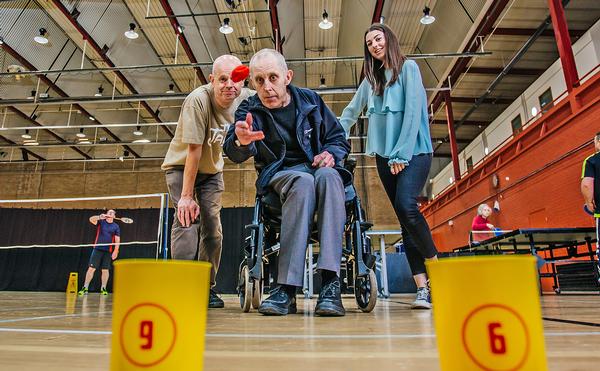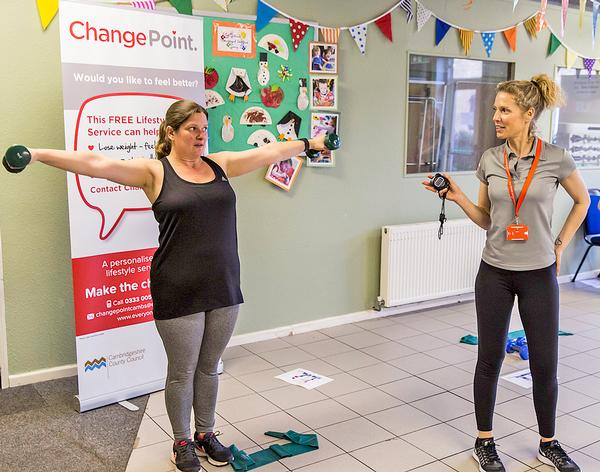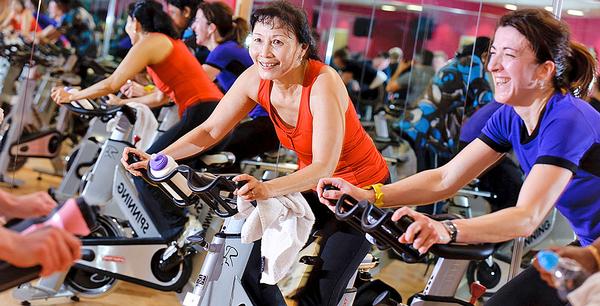|
Leisure Management - Social Value

Sport Development

|
|
| Social Value
|

In our last issue, we explored how sport and leisure providers can demonstrate social impact in line with the new government and Sport England agendas. Here, we speak to five organisations who are doing just that
|
|
|

|
Method: Datahub’s
Social Value Calculator
GLL has been using DataHub’s Social Value Calculator (SVC), delivered in partnership with Experian and Sheffield Hallam University, to measure the social value of its interventions since 2016.
As a charitable social enterprise, measuring the social impact of its work in local communities is at the heart of GLL’s ethos, even forming part of its annual corporate plan.
Will Barr, who heads up GLL’s business intelligence team, worked with 4 Global to design the SVC and implement the module into GLL’s 250 leisure centres. Liaising with DataHub’s development team, Barr helped ensure the SVC – which won Spark of Innovation at the 2017 Flame awards – meets a real operator’s needs.
“We opted to ensure needs were met by measuring the cost savings to society in four key areas: improved health, greater subjective wellbeing, increased educational attainment and reduced crime,” explains Barr.
“Now, if we put on a specific programme – for example, No Strings Badminton – we can demonstrate exactly what social impact that had, with which demographic groups, within any centre. Crucially the social value generated is monetised, which we can then use to bid for future funding. The data is so specific we could drill down and find out the social impact of squash on a particular court.”
For every £1 spent by GLL to deliver its activities, the trust generates £2.02 in social value; a total of £423 per customer. Overall, it generated £350.4m in social value in 2016, nearly £90m more than in 2015. Broken down, this amounts to more than £75m in improved health, £262m in increased life satisfaction, £12m in increased educational attainment and £266,000 in reduced crime.
Using these figures to bid for future tenders will be a major GLL selling point going forward. The organisation also plans to use the calculator to establish which community schemes are on target, and where refinement is needed. “Lots of our community work is, essentially, guesswork at the moment. Using the SVC we can see exactly what is effective and where. It will definitely influence some of our decision-making at a grassroots level,” says Barr.
"The data is so specific we could drill down and find out the social impact of squash on a particular court" – Will Barr, GLL
| |


|

GLL uses the SVC to determine which grassroots initiatives are effective |
|
|

|
Method: Sheffield Hallam University’s SROI model
In 2015, Sheffield City Trust and its operational arm SIV commissioned Sheffield Hallam University’s Sport Industry Research Centre (SIRC) to conduct a study into the Social Return on Investment (SROI) generated at its facilities (seven leisure centres, an ice rink and five golf clubs) during 2014/2015. The methodology used was adapted from the national model used by SIRC in its England-wide study of SROI in sport.
Healthy partnerships manager Rob Womack explains that, as a charitable organisation, SIV’s primary objective is to improve Sheffield’s health through a variety of initiatives.
However, when it came to demonstrating the impact of this work, the trust increasingly felt the data (such as number of visits or number of members) did not adequately reflect the social benefit it was creating. This ultimately led it to undertake an SROI review.
The study found that for every £1 invested by the council, there was a ‘societal return’ of £2.01 in benefits relating to health, crime and education. And for every £1 it spent on its well-established Physical Activity Referral Scheme in particular, the return was £3.42.
But even more valuable than these figures, says Womack, was the evidence of SIV’s impact on disease. “In one year, we’ve prevented 251 cases of coronary heart disease, 61 cases of type 2 diabetes and 60 cases of dementia. To me, that’s much more powerful, because it shows we’re impacting not only the quality of life of those individuals, but also of their families.”
The report has already helped SIV to secure a £50,000 Big Potential grant from the Lottery, which it will use to explore new ways of attracting social investment. “We wouldn’t have got that money without some sort of evidence-based impact report,” says Womack.
"We wouldn’t have got the £50,000 grant without some sort of evidence-based impact report" – Rob Womack, SIV
| |


|

SIV can now put a monetary value on every initiative it runs |
|
|
 |

Organisation: Everyone Health |
 |
Method: iMPACT outcome management solution
Everyone Health, the sister company of leisure operator Everyone Active, delivers a wide range of health-related services to local authorities from Cambridgeshire to Nottinghamshire.
In 2016, the provider collaborated with software supplier Gladstone to develop iMPACT, a new outcome management system that has not only improved the efficiency of its service delivery, but also makes it easier to collect and report on outcome data and KPIs.
Steph Shadwell, health data and informatics manager at Everyone Health, says: “We now use iMPACT on all our health contracts to report on KPIs from number of referrals, starters and completers to change-over-time measures such as weight, BMI and dietary intake.
“In-depth reporting is a requirement of contracts and without a functional database we simply couldn’t achieve this. iMPACT gives us confidence in our ability to report accurately back to commissioners.
“It also enables our practitioners to measure patients’ progress against set targets so they can give instant feedback to drive motivation.”
"iMPACT gives us confidence in our ability to report accurately back to commissioners" – Steph Shadwell, Everyone Health
| |


|

Everyone Health runs initiatives that help people lose weight healthily |
|
|
 |

Organisation: Vision Redbridge |
 |
Method: ReferAll exercise referral management solution
Vision Redbridge Culture and Leisure reviewed its Exercise on Referral scheme in 2014, moving from a paper-based referral system to a software solution from ReferAll. This allows online referrals to go from primary care, mental health teams, cardiac rehab teams and hospitals to Redbridge’s Exercise on Referral (EOR)team and, in turn, to all the centres in the borough with gyms.
Steve Smith, exercise on referral manager at Vision Redbridge Culture, says: “In 2015, we secured £173,000 of funding from Redbridge Public Health. To achieve this, we showed data that included the number of users accessing EOR programmes, the number completing all 12 EOR sessions and the number still participating in regular physical activity six months after completing EOR.
“Our data continues to show the success of our EOR programmes. In the year 2015 to 2016, we saw an increase in the number of participants accessing and completing EOR as well as in continued participation. One of the most exciting statistics is the number of participants showing weight loss and reduction of initial BMI, blood pressure and waist circumference six months after completing our EOR programme, which stands at an amazing 88 per cent. We’ve also reduced the use of clinical and GP services by our participants by, on average, over 65 per cent in this 12-month period.
"We secured £173,000 of funding by showing our Exercise on Referral data" – Steve Smith, Vision Redbridge
| |


|

Eighty-eight per cent of Exercise on Referral participants lost weight |
|
|
 |

Organisation: Oxford City Council |
 |
Method: Quest for Active Communities quality assessment
This year, Oxford City Council became the first organisation in the country to receive an ‘Excellent’ rating in Quest for Active Communities, the new assessment model from Quest, Sport England’s quality scheme for sport and leisure. A remarkable achievement, since, eight years prior, its sport and leisure provision had been rated poor by the Audit Commission.
According to Hagan Lewisman, active communities manager at the council, Quest’s decision to replace the Sport Development assessment with a new model dovetailed perfectly with changes the council was already implementing. This included internal restructuring to create an Active Communities services team, and integrating the individual teams for Sport and Physical Activity, Leisure, Parks and Green Space Development, Youth Ambition and Community Centres.
The new team has forged closer partnerships with the council’s housing, planning, environmental sustainability and community safety teams, as well as external groups such as community associations, tenants and residents’ associations, housing associations and even pubs.
Lewisman says: “The new Quest model very much reflects the direction we’ve been moving in: working in partnership to have a more demonstrable impact within our communities. It focuses on the impacts delivered in a better, more holistic way; and it has allowed us to showcase more of the work we already do while also highlighting new areas for us to grow into.”
According to Lewisman, working with Quest over the past eight years has also helped to attract external funding of more than £1.3m. “It gives funders confidence that we’re well run, showing that we have a fantastic track record of delivery and can demonstrate great results.”
"It has allowed us to showcase more of the work we already do while also highlighting new areas for us to grow into" – Hagan Lewisman, Oxford City Council
| |


|

Working with Quest has helped the council to attract funding |
|
|
 |
| Originally published in Sports Management Nov Dec 2017 issue 134
|
|
 |
|